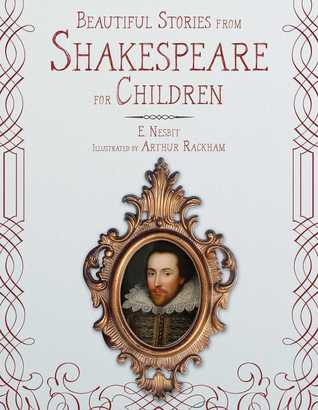First sentence: It was evening. The fire burned brightly in the inn parlour. We had been that day to see Shakespeare's house, and I had told the children all that I could about him and his work. Now they were sitting by the table, poring over a big volume of the Master's plays, lent them by the landlord. And I, with eyes fixed on the fire, was wandering happily in the immortal dreamland peopled by Rosaline and Imogen, Lear and Hamlet. A small sigh roused me--
"I can't understand a word of it," said Iris.
"And you said it was so beautiful," Rosamund added, reproachfully. "What does it all mean?"
Premise/plot: E. Nesbit has adapted fifteen of Shakespeare's plays into short stories for children. The plays she's chosen to adapt are as follows: "The Tempest," "Romeo and Juliet," "A Midsummer Night's Dream," "Hamlet, Prince of Denmark," "As You Like It," "King Lear," "The Taming of the Shrew," "Cymbeline," "Twelfth Night," "The Winter's Tale," "Pericles, Prince of Tyre," "The Comedy of Errors," "Macbeth," "Othello," and "The Merchant of Venice." Nesbit chose to adapt a few of his comedies and a few of his tragedies but none of his history plays.
The Tempest
Prospero, the Duke of Milan, was a learned and studious man, who lived among his books, leaving the management of his dukedom to his brother Antonio, in whom indeed he had complete trust. But that trust was ill-rewarded, for Antonio wanted to wear the Duke's crown himself, and, to gain his ends, would have killed his brother but for the love the people bore him. However, with the help of Prospero's great enemy, Alonso, King of Naples, he managed to get into his hands the dukedom with all its honour, power, and riches. For they took Prospero to sea, and when they were far away from land, forced him into a little boat with no tackle, mast, or sail. In their cruelty and hatred they put his little daughter, Miranda (not yet three years old), into the boat with him, and sailed away, leaving them to their fate.Romeo and Juliet
Once upon a time there lived in Verona two great families named Montague and Capulet. They were both rich, and I suppose they were as sensible, in most things, as other rich people. But in one thing they were extremely silly. There was an old, old quarrel between the two families, and instead of making it up like reasonable folks, they made a sort of pet of their quarrel, and would not let it die out.My thoughts: I enjoyed this one. I was familiar with about half of these stories. There are still some of Shakespeare's plays I haven't read yet.
I'm not convinced that Shakespeare's plays make for the best stories for children. His plays usually have quite adult content. But these stories, of course, do not.
Reading these stories back to back one sees how similar Shakespeare's plays can be to one another.
I do wish she'd chosen to adapt some of the history plays. I would LOVE to find a collection that does include the history plays adapted for a younger audience.
© 2019 Becky Laney of Becky's Book Reviews


No comments:
Post a Comment